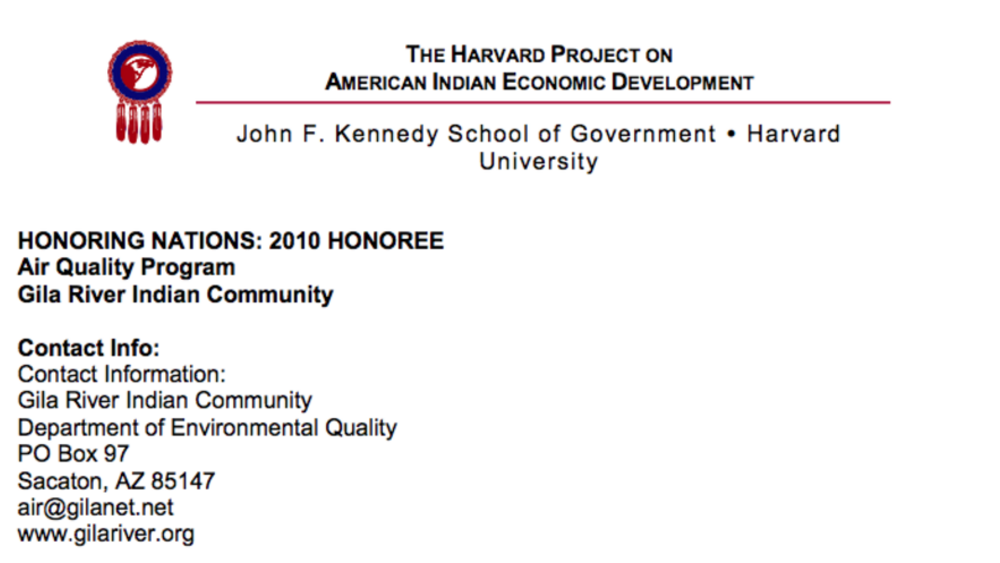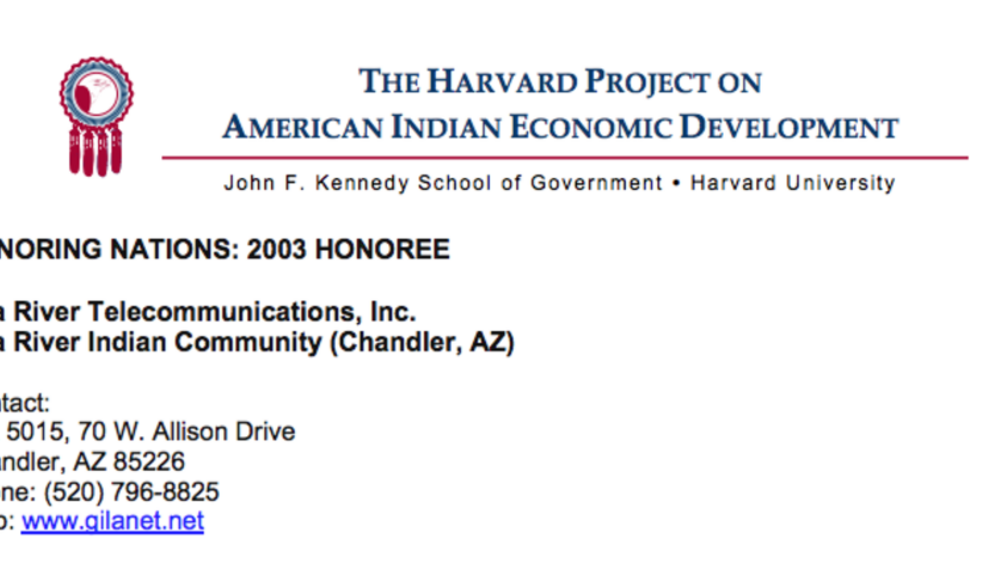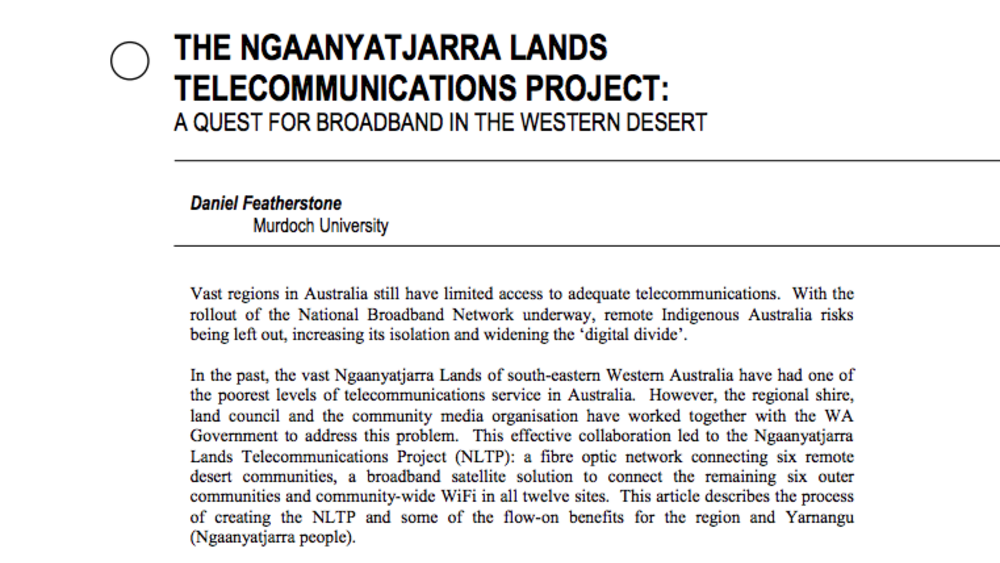Former Gila River Indian Community Lieutenant Governor Cecil F. Antone provides an brief overview of the evolution and growth of Gila River Telecommunications, Inc. (GRTI), an enterprise of the Gila River Indian Community.
Additional Information
Antone, Cecil F. "Nation-Owned Businesses: Gila River Indian Community, Inc." Building and Sustaining Tribal Enterprises seminar. Native Nations Institute for Leadership, Management, and Policy, Udall Center for Studies in Public Policy, University of Arizona. Tucson, Arizona. March 29, 2007. Presentation.
Transcript
"I'm going to try to give a little bit more perspective of what we've done at Gila River, and not so much on the technical stuff that's been provided to you with the slides and so forth, because I think that's what you really need to know is the relationship we have with our council and our administration.
As it was mentioned, GRTI (Gila River Telecommunications Inc.), we call it GRTI, it was established in 1988 as a tribally owned telephone company. And how we got into it is, simply the fact that at the time US West©, as some of you recall US West© was the big phone company in the west and still is today with Qwest©, their new title. But what happened, what was going on in our communities, even though we're located right next to Phoenix, which is probably the sixth- or fifth-largest city in the country now, we couldn't get adequate phone service simply because of the fact it was cost prohibitive. At that time, our Governor Tom White, he tried to ask for service to his residents and he only lived, the closest line was like maybe less than a quarter of a mile and they were going to charge him like $20,000 just to hook in. So as in any community or urban area, you know who gets the most attention is the cities. But in our case, since we're close to the City of Phoenix, it was just, and the other suburbs, it was a little bit difficult for us. So what we did was partner with a group out of Oklahoma, a company, and we initially set up as a 5149 corporation under the laws of the Gila River Indian Community.
I was on the first, I was chairman of the, as was mentioned, the chairman of the board for the first five years. And it was a very difficult time for us because at the time maybe, I can't remember exactly the percentage of members that had phones, but it was like in the very populated area like Sacaton and the west end of the community. What happened was that the membership or the people that had phones were kind of against us getting the phone business because we didn't know if we were going to succeed or fail. So we went through that process, got established by the council and it took a while. In fact, we had two recalls on some of our council members simply because they supported the effort of getting the telephone business. Of course they got back on again, but it was a struggle and there were times that I thought to myself or other board members, was it worth it? But we stuck together and today it's doing very well.
We've done quite a bit of improvements since... you've seen the overview of our company. The other thing that happened at the same time, which is quite interesting and it's really helping us out right now is that in 1988 and '89 if you recall, the FCC were issuing our licenses for cellular, when cellular was becoming a very important part of our life. I guess today even more than ever, everyone's got a cell phone. Anyway, at the time we only had two members. As I mentioned, when we were starting our phone company and two members that could always speak to each other, they were neighbors across. And part of the requirements in order to apply for the lottery, in this case, you had to at least have a phone company per se, but because of these two families that live across from each other we qualify as this phone company. And so we applied for the lottery. Of course the other, US West© and the other telephone companies in the areas, already had an agreement in place. So whoever won the lottery, they would all share the responsibility in developing the cellular area. Guess who won the lottery? We did. We tried to ask to be a part of that group and they said no, so we did it on our own and we won the lottery. And it was a long battle, but in the end we did own, we gave up a little bit of it. And today we own 25 percent of the ownership of that market between Tucson and Phoenix. And it's been very lucrative for us because at the time it was $100 investment to put in the paperwork. Every quarter we get a dividend from Verizon anywhere from $1.5 to $2 million every quarter and that's free money that we utilize to enhance our phone company. Fortunately, the time was right for us to do that. So it was an effort that the council supports us now.
Next year is going to be our 20th anniversary that we've been a phone company. And we provide a lot of opportunities for our membership; we do a lot of training for our members that want to go in the telephone business. We are expanding. We're going to different types of services. As you look in your little information that's been provided to you, we are going into other types of business. One of them is the Native Technology Solutions and there are brochures on the table, I brought some this morning. Basically we're expanding to provide other services throughout the community. Currently we are, our company is doing some work right now in Salt River for the schools -- the high school and day school, I can't remember which -- but we're planning to go out to the other areas from the local area to help other communities provide this service to them. One of the original things that, when we set the phone company up was to do video of our council meetings and because of circumstances that we couldn't control, the cost prohibitive at the time we were looking into it, that was the first thing we always heard when we'd go to council and give our report is, "˜When are you going to put us on TV, one of the members?' And about a year ago -- I wasn't on the board -- but at the time we were directed to and then within three days they had the first council meeting but that was just one council meeting that they had it videoed and it was seen by the membership. But we are in the process of finalizing hopefully in the next month or so or two months we'll have, that'll be offered at every council meeting from here on. But I guess the council wants to see themselves on TV I guess.
One of the things I guess to add on what was discussed earlier was I guess when Mary and I were in office, one of the things that we felt very strong [about] was communication with our council and our members, as was mentioned already about the money. Because at the time me and Mary were in the office when gaming came into being at least we stepped forward and got our casinos in place and it was very important that the membership know exactly where the money's going to. It was some exciting times but we had to establish different programs, departments. So it was very important at least for me to establish a real good relationship with our council, because a lot of the projects that we built or started when Mary and I were in office are in place now, but it was very important to have the council understand the direction we were going because they would wonder when we go to Washington D.C. what would we actually do with Congress. Of course we had to go talk to them and ask them about certain programs that we're involved in, but we also would take them along with us. And they finally realized that it's a lot of work going back in both sides of the House and trying to establish your program and priorities to Congress. I think that was probably the most gratifying event for me during my tenure as lieutenant governor is that communication I had with our council because it's very important to keep them abreast of what you're doing and what the company is all about.
What we do every quarter is give a report to the council, both financial, the activities we're involved in, the other things that we're doing within Congress. I was just telling Ken Robinson about the farm bill that's coming up this year and a lot of the cooperative telephone companies that we deal with, that's very important because that's where you get our U.S. funding and that's how you establish your phone companies. As they mentioned earlier about either you're going to fail or not, at the time we were seeking federal funds, it was REA funds at the time. And we, as far as the telephone side of REA at the time, you could have a power side and then a telephone side, you can get funds through the federal government. They had never had a telephone company ever fail and fortunately we never failed. In the first five years, I think we were in the black. We started there. We have about 3,000 customers that we have in place. It's just a big opportunity for us now simply because our location. I guess one of the things I look at economic development is location, location, location. If you've got location to the sixth-largest city, it's an added incentive to your community because it creates jobs and then you diversify yourself. It was mentioned in my little brochure about the Wildhorse Pass Development Resort & Spa. That was one of the projects I worked on when I was in office and now it's there and starting to expand our whole area along that area because the more industry you bring in the more services they need, in this case our telephone services. It's been an exciting time for us at least in this endeavor, but the technology has changed since I left the board. I left the board in 19--, when I went into politics, lieutenant governor in 1994. And since then I'm just overwhelmed. Both Mary and I just got on the board a year ago come June and it's just amazing what has happened within the last 15 years, 10 years.
Anyway, that's all I wanted to present to you today. If you have any questions, I'll try to answer them. I'll leave you with one note is that and I said it already about communication. I think it's very important that you talk to your council and your membership. What Steve mentioned about rumors about money here and there. We used to put it in our newspaper too is the budget for the fiscal year and then we'd leave financial reports to the council of course. That's all I can say, I can't say enough for communicating with your membership and your council. Thank you."



